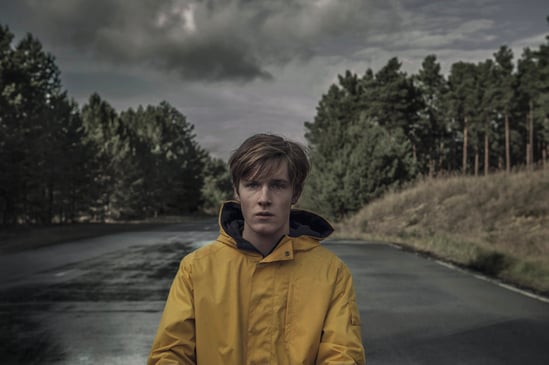Unraveling Time's Tangled Web: Exploring the Depths of Dark Season 1
Cinemapedia
Dark, the German sci-fi thriller created by Baran bo Odar and Jantje Friese, debuted on Netflix in 2017 and instantly captivated audiences with its complex narrative, haunting visuals, and existential themes. The first season of this groundbreaking series explores the intricacies of time travel, family secrets, and the interconnectedness of human lives. With its stunning visuals, masterful storytelling, evocative music, and thought-provoking moral questions, Dark Season 1 is a masterclass in television.
A Gloomy Elegance That Reflects the Story’s Depth
The visual style of Dark is one of its most striking elements. Set in the fictional German town of Winden, the series creates an atmosphere of foreboding and mystery through its muted color palette of grays, blues, and greens. The dense forests, dimly lit caves, and perpetually overcast skies give the show an eerie, almost oppressive aesthetic that mirrors the emotional weight of its narrative.
The cinematography is meticulous, with every shot designed to heighten the sense of unease. Symmetry and framing are frequently used to evoke a sense of order amidst the chaos of time loops, while recurring imagery—such as the nuclear power plant, the mysterious cave entrance, and the ticking of clocks—reinforces the show’s central themes of time and inevitability. The transitions between timelines (1888, 1953, 1986, and 2019) are seamless, visually linking the past, present, and future in a way that underscores the cyclical nature of the story.
A Labyrinth of Time and Tragedy
At its heart, Dark Season 1 is a multi-generational saga that begins with the disappearance of two boys, Erik and Mikkel. This event sets off a chain reaction that uncovers a series of hidden connections between four families: the Nielsen, Doppler, Tiedemann, and Kahnwald clans. As secrets unravel, the characters discover that their lives are inextricably linked through time travel and a mysterious wormhole located in the caves near the nuclear power plant.
The narrative is both intricate and rewarding, weaving together themes of loss, betrayal, and the human desire to control fate. Each episode adds layers to the mystery, revealing shocking twists and expanding the story’s scope. The series challenges viewers to keep track of multiple timelines and the shifting relationships between characters, making it a deeply engaging and intellectually stimulating experience.
The character development is exceptional, with each individual grappling with their own moral dilemmas and personal tragedies. Jonas Kahnwald (Louis Hofmann) emerges as the central figure, struggling to navigate his role in the unfolding chaos while confronting the haunting truth about his family and his own identity.
An Atmosphere of Dread and Melancholy
The music in Dark plays a crucial role in establishing the show’s haunting atmosphere. The original score, composed by Ben Frost, combines ambient electronic sounds with eerie, otherworldly tones that evoke a sense of unease and mystery. Frost’s use of dissonance and silence creates tension, heightening the emotional impact of key moments.
In addition to the score, Dark features a carefully curated selection of songs that enhance its mood and themes. Tracks like “Goodbye” by Apparat and “Irgendwie, Irgendwo, Irgendwann” by Nena serve as poignant reflections of the characters’ struggles and the overarching theme of time’s relentless march. The music seamlessly integrates with the visuals and story, creating an immersive viewing experience that lingers long after the credits roll.
Fate, Free Will, and the Cyclical Nature of Time
Dark is not just a story about time travel; it’s a meditation on the human condition. The series delves into profound philosophical questions about fate, free will, and the consequences of our actions. It challenges viewers to consider whether we are truly in control of our destinies or if we are bound by the unchangeable cycles of time.
The concept of moral ambiguity is central to the show. Characters are forced to make difficult choices, often with devastating consequences. There are no clear heroes or villains in Dark—only flawed individuals trying to make sense of an incomprehensible situation. This complexity makes the story deeply relatable and emotionally resonant.
One of the most powerful moral lessons in Dark is the idea that our actions ripple through time, affecting not only ourselves but also future generations. The series serves as a cautionary tale about the dangers of secrecy, betrayal, and the pursuit of power, while also highlighting the enduring strength of love and family bonds.
A Timeless Masterpiece
Dark Season 1 is a triumph of storytelling, blending science fiction, mystery, and human drama into a thought-provoking and emotionally charged narrative. Its stunning visuals, intricate plot, evocative music, and profound moral themes make it a standout in the realm of modern television. The series challenges viewers to think deeply about the nature of time, the impact of our choices, and the interconnectedness of all things.
For those who appreciate complex, character-driven stories with a philosophical edge, Dark is an absolute must-watch. It is a testament to the power of storytelling to explore the deepest questions of existence while delivering a thrilling and unforgettable viewing experience.


